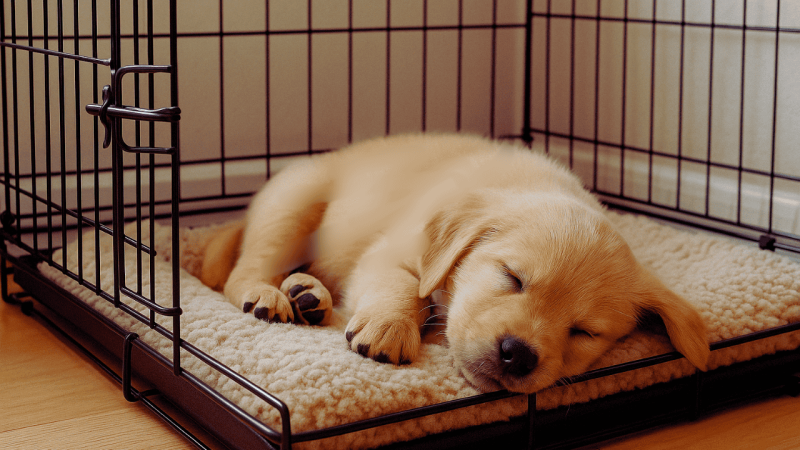Why Many Dogs Sleep Better in Crates

Sleep is just as important for dogs as it is for humans. Quality rest affects their mood, energy levels, and overall health. Yet not all sleeping arrangements offer the same benefits. Increasingly, trainers and pet behaviorists note that dogs sleep better in crates than when left on open beds. While it may seem counterintuitive to some owners, the science behind this choice is rooted in canine instincts and psychology.
The Natural Denning Instinct
In the wild, dogs’ ancestors sought small, enclosed spaces to rest. Dens provided protection from predators, shelter from weather, and a quiet retreat. Modern dogs still carry this instinct. A crate mimics the security of a den, creating an environment where a dog can relax completely.
When given the option between an open, vulnerable spot and a crate with solid sides, many dogs choose the latter. The walls signal safety, which allows their bodies to switch from alertness to deep rest.
The Difference Between Beds and Crates
Beds are comfortable, but they do not limit external stimuli. A dog resting on an open bed is exposed to noises, movement, and light — all of which can trigger alertness. Even a minor sound can cause them to lift their head, bark, or move restlessly.
In contrast, a crate reduces these distractions. The partial enclosure softens sound, blocks visual triggers, and fosters an atmosphere of calm. This explains why behaviorists often report that dogs sleep better in crates and enjoy longer, uninterrupted sleep cycles.
Crates Reduce Anxiety
Many dogs suffer from mild anxiety, especially when left alone or exposed to overstimulating environments. A crate functions as a safe retreat where they can regulate emotions. Instead of pacing, barking, or searching for comfort, dogs settle faster in a familiar, enclosed space.
For dogs that are prone to separation anxiety, the crate becomes a stabilizing tool. Owners who introduce crate time positively often notice improved behavior during the day and deeper rest at night.
Puppies and Sleep Training
Puppies, like human babies, need structure to develop healthy sleep patterns. Without guidance, they may nap sporadically, wake frequently, and disturb household routines. Crates provide a consistent environment that encourages them to settle quickly.
Puppies also benefit from learning boundaries early. A crate teaches them where rest should happen, preventing habits like wandering at night or chewing furniture. Over time, this structure shapes more predictable sleep cycles.
Adult and Senior Dogs
Crates are not just for puppies. Adult and senior dogs also benefit from restful crate sleep. For active dogs, the crate signals downtime after play or exercise, helping them conserve energy. Older dogs, who may struggle with mobility or joint pain, find comfort in a secure, padded crate where they are less likely to be disturbed.
The sense of routine also eases transitions. Whether traveling, visiting the vet, or moving to a new home, dogs who are crate-trained adjust faster because their sleeping environment remains familiar.
Making the Crate Comfortable
To maximize sleep quality, owners should ensure the crate feels like a welcoming retreat. Simple steps include:
-
Adding a soft bed or orthopedic mat.
-
Placing a favorite toy or blanket inside.
-
Positioning the crate in a quiet, draft-free corner of the home.
-
Using covers or panels to reduce outside distractions.
The goal is to make the crate inviting, not restrictive. When dogs see it as their personal space, they willingly retreat there to rest.
Avoiding Misuse
While crates provide many benefits, misuse can create problems. Leaving a dog in a crate for excessive hours or using it solely as punishment undermines its value. Instead, crate time should be balanced with exercise, play, and social interaction.
When used correctly, crates enhance, rather than limit, a dog’s well-being.
Expert Insights
Trainers often highlight the connection between crate use and improved behavior. Well-rested dogs are less reactive, easier to train, and more adaptable to change. Sleep affects everything from digestion to emotional stability. By providing the right environment, owners can ensure their pets thrive.
A Valuable Resource
For owners seeking practical strategies, resources like doganxietysupport.com offer guidance on managing anxiety, improving sleep, and making crate training positive. These insights help dog owners create environments that support both mental and physical health.
